The French bulldog breed, also known as the “Frenchie,” is a unique breed of domestic dog. They were initially bred in France in the 19th century and have become one of the most popular dog breeds in the world. Canvas Personalized is your guide to understanding everything about these Bulldogs, from their distinct characteristics and personalities to their specific care requirements.
1. Overview of the French Bulldog Breed
Take a look at the French bulldog breed standard table below. Some individual Frenchie, both male and female, might fall outside this range due to factors like genetics, diet, and overall health.
1.1. Key traits of French Bulldogs
| Origin | France | Good With | Families, children, other dogs |
| French name | Bouledogue Français | Temperament | Playful, affectionate, independent |
| Height | 11 inches (28 cm) to 13 inches (33 cm) at the withers (the highest point of the shoulders between the shoulder blades) | Energy Level | Average |
| Weight | Under 28 pounds | Shedding | Normal |
| Life span | 10-12 years | Tendency to Drool | High |
| Coat | Short and smooth | Snore | High |
| Color | Black with or without white, fawn, white | Bark | Moderate |
| Hypoallergenic | No | Easy To Train | High |
| Other traits | Easy to groom; prone to health issues; apartment-friendly; good for first-time pet owners and strong loyalty tendencies |
1.2. Appearance
- Compact Muscle with a Flat Face and Bat Ears:
The Frenchie packs a surprising amount of muscle into its compact frame. Despite their shortness, they have large, square heads topped with signature “bat ears.” The American Kennel Club highlights two key features of the French Bulldog: their bat ears and unique skull shape, described as “half-flat, half-domed.” This face structure is classified as brachycephalic.
Their undeniable cuteness comes from their squished cheeks and prominent wrinkles adorning their faces and shoulders. It’s this combination of features – the bat ears, flat face, and wrinkles – that truly sets them apart from English bulldog breeds.

- Smaller than traditional Bulldogs:
French Bulldogs are smaller than the traditional Bulldogs, reaching a maximum weight of around 28 pounds at a healthy weight. This is significantly less than the 50 pounds their larger cousins can reach.
- Expressive Eyes and Varied Coats:
French Bulldog breed has round, expressive eyes that are typically a dark brown color, although some may have green or blue eyes (considered non-standard). Their coats come in a variety of colors, with cream, fawn, and white being the most common. Brindle patterns and black masks are also possible.
- Short Tail:
Due to their short stature and round rear end, the tail can often be obscured by their body. However, it’s always present, adding to their compact and playful look.
One common misconception is that French Bulldog tails are docked (a practice where part of the tail is surgically removed). In reality, the short tail is a natural breed characteristic due to selective breeding over generations.

1.3. Personality Traits
Despite their lovable appearance, French bulldogs’ personality traits are an independent spirit; one could even call them stubborn. Don’t let that fool you, though. These dogs are incredibly sociable pets that form strong attachments to their human families and enjoy life to the fullest. Here are some key personality traits:
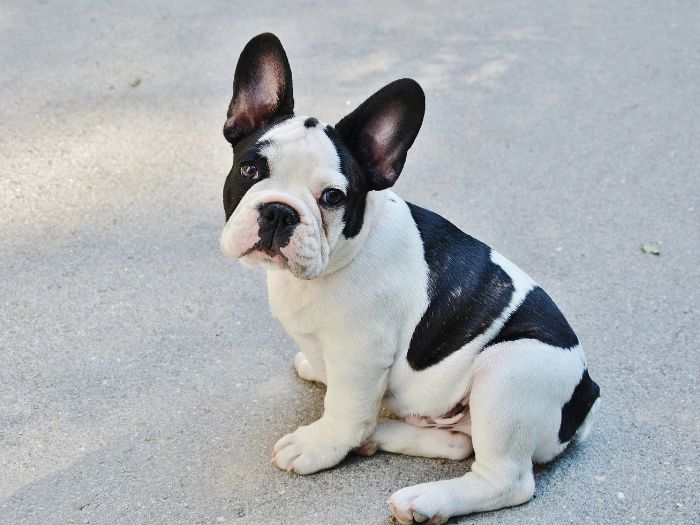
- Affectionate: The French Bulldog is known for their affectionate and loving nature. The dog enjoys cuddling and being close to their owners, and they often become attached to their families.
- Playful energy: Frenchies are playful dogs that love to play and run around. They are particularly playful with children, and they make great playmates for kids.
- Easygoing: A purebred French bulldog is generally an easygoing and laid-back dog. They are not typically aggressive or overly excitable and adapt well to new environments and situations.
- Easy to train: They are intelligent and eager to please, which makes them easy to train. They respond well to positive reinforcement and reward-based training methods.
Early training and socialization help French Bulldog puppies feel comfortable with new people and dogs. While not excessive barkers, they can be alert watchdogs. Overall, these pups can be great companions for families with children and potentially other pets with proper introductions.
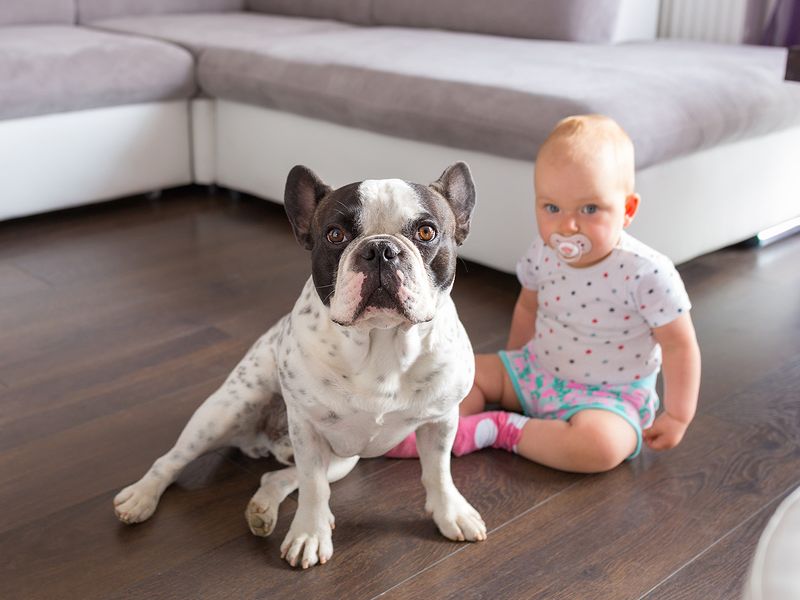
2. French Bulldog History
In the mid-1800s, English lace makers, particularly those in Nottingham, developed a fondness for a toy-sized Bulldog. It became their mascot. However, as lace production fell during the Industrial Revolution, many lace workers were forced to migrate, taking their cherished toy Bulldogs with them. So they made their way to the north of France.
French lace makers adopted these little Bulldogs, and over time, these dogs were crossed with other breeds, possibly terriers and Pugs. This interbreeding is believed to be responsible for their now-distinctive bat ears. The French dubbed them “Bouledogue Français.”
As time went on, the charming Frenchie became the city dog in Paris. These pups became associated with the Parisian cafe culture, favored by socialites and those enjoying the city’s vibrant nightlife. Artists like Degas and Toulouse-Lautrec even captured them in their paintings of Parisian high society.

By the late 19th century, Frenchie’s popularity had spread across Europe and even reached America. However, their journey wasn’t universally smooth. In England, the Bulldog was a national symbol, and some found it offensive that the French had “adapted” it.
Interestingly, the look of the breed was significantly influenced by American Frenchie fans in the early 20th century. They championed the unique bat ears over the traditional rose ears, ultimately influencing the breed standard. This distinctive feature is what makes the Frenchie instantly recognizable around the world.

3. Ideal Owner: Are French bulldogs good house pets?
French Bulldogs are known for their loyalty and affection, making them the perfect companions for a wide range of owners. Their small size and pleasant demeanor make them a great fit for apartments and smaller living spaces. They are also a great fit for families, easily getting along with children and other pets thanks to their kind and lively nature. Interactions with infants and toddlers, however, should be supervised.
Frenchies are an ideal choice for the elderly or those with disabilities, as they provide companionship without requiring as much activity as other breeds. Whether you’re cuddling up on the couch or joining you in your daily routines, they’re happy and loving.
>> Click here to discover and choose an amazing country dog name for your new Bulldog!
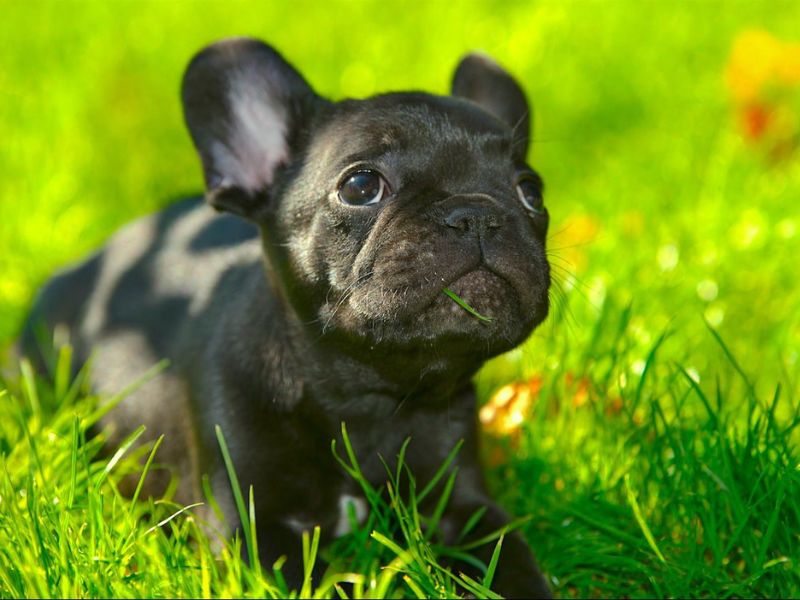
4. Caring for French Bulldogs
4.1. The Basics Needs
The French bulldog breed is a low-maintenance breed that requires minimal grooming, but there are specific care requirements to keep your Frenchie healthy and happy. Some of the critical aspects of caring for and grooming this dog include:
- Exercise: Frenchies are not built for strenuous exercise and are generally happy with shorter, more frequent walks or playtime throughout the day. Aim for a total of 30-60 minutes of daily activity, which can be split into two or three sessions.
- Bathing: They have a short, smooth coat that is easy to clean and maintain. They should be bathed using a gentle dog shampoo every 2-3 months, or “as needed.” This means bathing them when they become visibly dirty, smelly, or roll in something unpleasant.
- Brushing: Even though they don’t shed excessively, French Bulldogs benefit from regular brushing to remove loose hair, distribute natural oils, and prevent matting. Aim to brush your Frenchie at least once a week, with more frequent brushing (2-3 times) during shedding seasons (typically spring and fall).
- Nail Trimming: Most dogs’ nails should be trimmed regularly to prevent overgrowth and discomfort. If you hear your Frenchie’s nails clicking on hard floors when they walk, it’s a good indication they need a trim.
- Ear Care: Their ears are naturally folded, creating a warm, moist environment that can trap dirt, moisture, and debris. This can lead to infections if not regularly cleaned.
- Dental Hygiene: For optimal oral health, regularly brush your Frenchie’s teeth to prevent plaque. Consistent brushing, ideally daily but at least 2-3 times a week, along with chew toys and dental treats, will keep their teeth clean and healthy.
- Eye Care: Frenchies are prone to eye problems, so keeping their eyes clean and debris-free is essential. You can gently wipe their eyes with a damp cloth or cotton balls.
Hence, the French Bulldog breed is a low-maintenance breed that requires minimal grooming and care. With proper care and attention, they can live happy and healthy lives.
4.2. Training
Training a French Bulldog successfully may be summed up in two words: begin early. These dogs may appear tough, but they have sensitive personalities. Keep the dog’s training positive and upbeat, using treats, toys, and plenty of praise to reinforce good behavior. When French bulldog puppies feel frustrated, pause for a little break.
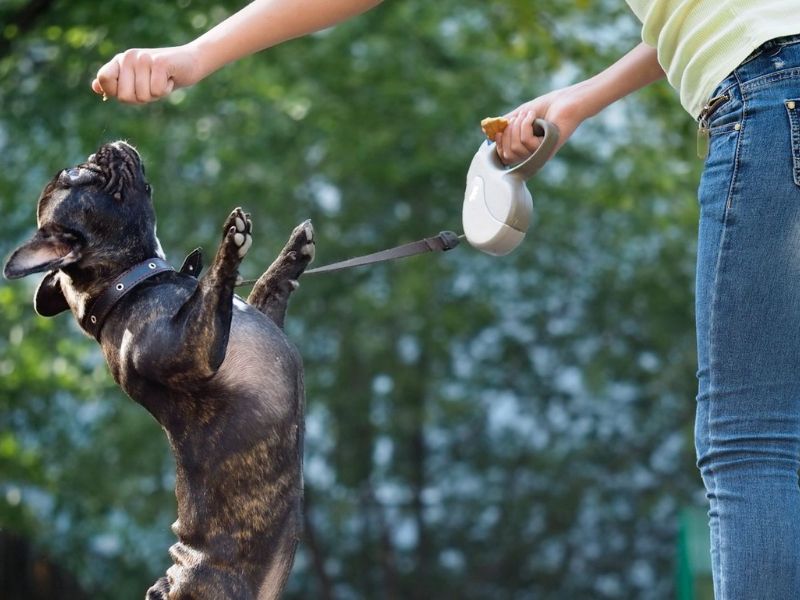
Proper socialization is crucial for French Bulldogs. Enroll them in puppy training classes around 8 weeks old to expose them to different dog breeds, people, and environments. You can also spend your time teaching your dog new basic cues, such as how to sit, stay, or go potty outside, and social skills, all while exposing it to other dogs and people. This encourages positive behavior and prevents fear or aggression later in life.
Regular training sessions aren’t just about commands. They’re a fantastic way to mentally stimulate your intelligent Frenchie and build a strong relationship based on mutual understanding. A well-adjusted Frenchie is a happy Frenchie, and training plays a vital role in achieving that happiness.

4.3. Feeding And Nutrition
The health and well-being of your pet depend heavily on the food you give it. Look for brands that meet AAFCO’s requirements in pet food regulation, and avoid fillers and preservatives. Additionally, select food based on your Frenchie’s age and size (puppy, adult, or senior). Their needs change throughout life, and the right food will provide optimal nutrients.

Proper nutrition is important for the health and well-being of your dog. Since the French bulldog breed is prone to obesity, it’s important to measure its food portions and feed it a balanced and nutritious diet. Feeding them 2-3 small meals daily rather than one large meal is best.
In terms of type of food, Frenchies should be fed high-quality dog food made for their size and activity level. Wet or dry food can be used, but choosing a high-quality brand free of fillers and preservatives is important. Moreover, omega-3 fatty acids, glucosamine, and chondroitin can be beneficial for French Bulldogs, but always consult your veterinarian before introducing any supplements.
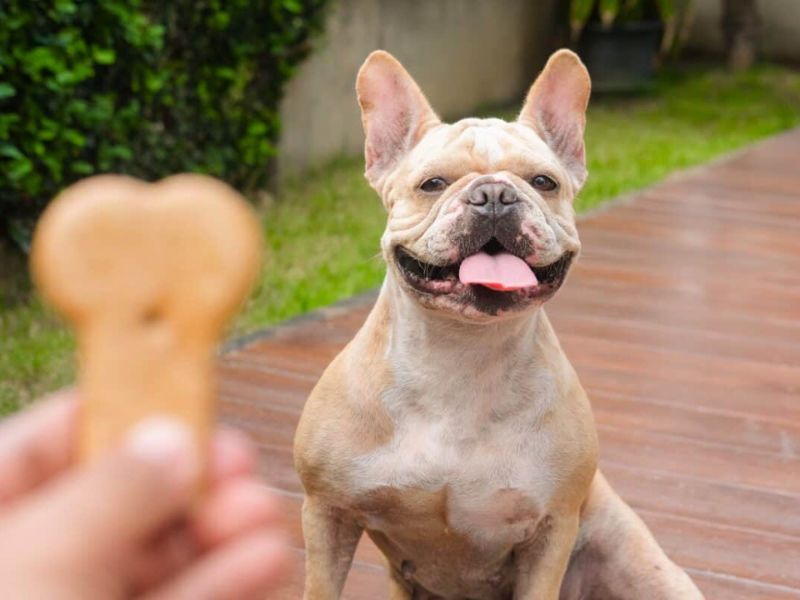
In addition, French bulldog puppies love treats but stick to healthy options like low-fat dog biscuits or fresh fruits and vegetables in moderation. Ensure that fresh, clean water is always provided, and encourage your Frenchie to drink regularly. Some of them have allergies to common ingredients like beef, wheat, or dairy, so it’s important to read ingredient labels carefully.
>>> Discover more healthy foods for dogs that you can easily find at home!
4.4. Living Environment
It is a small and adaptable breed that is well-suited to various living environments. Here are some key details about the French bulldog living environment:
- Space requirements: Frenchies are a small breed and do not require a lot of space. They can live in apartments, houses, or even tiny homes, as long as they have enough room to move around comfortably.
- Temperature regulation: They have short, smooth coats and are not well-suited to cold or hot climates. They are best suited to moderate climates and should not be left outside for extended periods in extreme temperatures.
- Outdoor access: Frenchies do not require much outdoor time, but they do need outdoor access for potty breaks and to stretch their legs. A secure, fenced yard is ideal, but regular walks on a leash are also important.

Hence, the ideal living environment for a French Bulldog is a moderate climate with plenty of socialization, exercise, and playtime. They can thrive in various living situations with proper care and attention and make wonderful, affectionate companions.
5. Health Issues
French Bulldogs are undeniably charming, but their unique features predispose them to certain health concerns. While genetics play a role, some of these issues can be prevented with vigilance and proper care. The good news is that most common health problems in Frenchies have treatment options available.
Schedule annual checkups for your Frenchie, with more frequent visits for senior dogs (over 11 years old) or those with health conditions. If your Frenchie suffers from any of these conditions, you might have to make more frequent trips:
- Brachycephalic Airway Syndrome: Frenchies have short, flat faces and small noses, which can cause breathing difficulties and make them prone to overheating.
- Skin Allergies: French bulldog puppies are prone to skin allergies, which can cause itching, redness, and hair loss. Food, flea bites, or environmental allergens often cause these allergies.
- Ear Infections: Frenchies have floppy ears, making them prone to ear infections. It’s essential to regularly clean their ears with a vet-approved solution to prevent issues.
- Eye Problems: The purebred French Bulldog is prone to eye problems, such as cherry eyes and cataracts. Regular eye exams by a veterinarian can help prevent or detect these issues.
- Intervertebral Disc Disease: Frenchies have a short, stocky build, making them prone to back problems such as intervertebral disc disease.
- Patellar Luxation: The dog is also prone to patellar luxation, in which the knee joint slips out of place.
- Obesity: Frenchies are prone to obesity due to their love of food and lower energy levels. So, it’s essential to control their food intake and provide regular exercise to maintain a healthy weight.

6. Getting the French Bulldog Puppies
6.1. Buying Frenchie from a Breeder
The cost of a French Bulldog puppy from a reputable breeder can vary widely depending on location, the breeder’s reputation, and the puppy’s age, pedigree, and color. On average, you can expect to pay anywhere from $2,500 to $6,000 or even more for this breed.
Reputable breeders focus on maintaining breed standards and health testing their breeding stock to minimize the risk of genetic health problems in puppies. They also typically provide support and throughout your Frenchie’s life guidance. Here are some reliable breeders for these bulldogs in the USA that you can consider:
| Reputable Breeders | Location | Contact | Rating |
|---|---|---|---|
| Bullworth French Bulldogs | Colbert, OK | (713) 504-0800 | 5.0 |
| Bulldan Kennels | Demorest, GA | (706) 499-2164 | 4.4 |
| Barksdale’s Bullies | El Dorado, AR | (870) 918-4473 | 3.8 |
| Huskerland Bulldogs | Center, NE | (402) 860-0306 | 4.9 |
6.2. French Bulldog Adoption
Adoption fees are typically significantly lower than purchasing from a breeder. At the French Bulldog Rescue Network, you can find puppies priced at $1,200.
However, some dogs may have unknown health histories and require additional veterinary care. Carefully research adoption organizations to ensure a positive experience. The table below shows our suggestions for adoption centers in the USA.
| Adoption Centers | Website |
|---|---|
| French Bulldog Rescue Network | frenchbulldogrescue.org |
| Rescue French Bulldogs | rescuefrenchbulldogs.org |
| Smiling Bulldogs | smilingbulldogs.com |
| Adopt-a-Pet | adoptapet.com |
6.3. Beyond Adoption/Purchase Costs
Regardless of how you acquire your Frenchie, remember to factor in the ongoing costs of caring for them, such as:
- Veterinary care: Regular checkups, vaccinations, and potential unforeseen medical needs.
- Food
- Toys and supplies: Durable toys, leash, collar, bed, etc.
- Grooming: While minimal, occasional professional grooming may be needed.

7. French Bulldog Fun Facts
- John Legend, Madonna, and Lady Gaga are just a few famous people who are fond of French bulldogs. Gary, Carrie Fisher’s French Bulldog, became a minor celebrity after accompanying his owner on numerous public appearances, including on the red carpet.
- French bulldogs are known for being outspoken and talkative. The French Bulldog Walter Geoffrey has gained thousands of YouTube subscribers because of his explosive behavior.
- Frenchies are a popular companion breed, ranking as the 4th most popular breed in the US.
- Frenchies have a unique vocalization, making a variety of grunts, snores, and snorts.
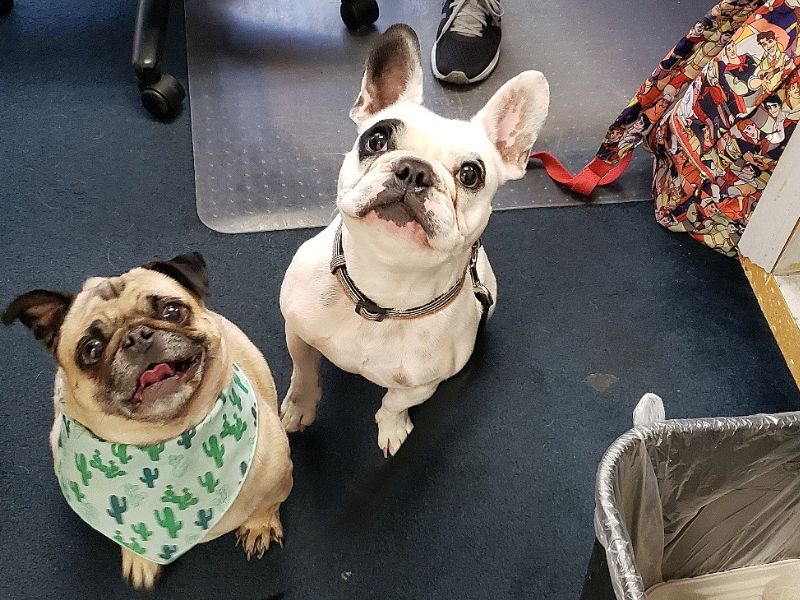
8. Some Famous French Bulldog Instagram Accounts 2024
In the world of pet influencers, the French Bulldog breed take the spotlight with their charming personalities and photogenic smiles. These adorable canines have not only captured the hearts of their owners but also amassed considerable followings on Instagram, becoming celebrities in their own right. Below are some of them:
- @watson_the_frenchbulldogg
- @stefanixdogs
- @millie.pup.the.frenchie
- @chunkithefrenchie
- @zeusthesuperherofrenchie
- @lulunasty
- @brucethefrenchbully
>>Further reading:
- Beagle Dog Breed: Discover The Playful Companion To Care For
- American Pitbull Terrier: A Guide to Its Background, Training & Care
- Top 14 Types Of Doodle Dog Breed: The Ultimate Guide
- All About Aussiedoodle Dog: Traits, Health, and Caring
The French Bulldog breed is a charming and lovable breed that has captured people’s hearts worldwide with its playful nature and affectionate personality. Whether you are a first-time dog owner or a seasoned pro, this breed will surely bring joy and laughter. We hope this post from Canvas Personalized is helpful for you in choosing the best canine for your family.










